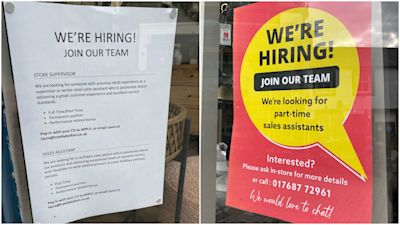Insight
Real pay slumps as businesses struggle to find workers

ITV News Business and Economics Editor Joel Hills reports on the recruitment issues hitting businesses as fears rise that unemployment may need to increase to keep inflationary pressures at bay
The post-Covid-19 pandemic recovery ran out of steam months ago and the talk is of a looming recession, but you wouldn’t know it if you walked down the high street in Keswick.
In almost every other shop, signs in the window advertise for waiting staff, fish fryers, kitchen assistants, sales assistants and store managers.
In the last few weeks, labour shortages have caused chaos at the UK’s airports.
Here in the Lake District, the peak summer season is approaching and the worry is there will be similar disruption unless recruitment problems can be solved.
There have never been so many vacancies in the UK economy. Across the country, there are 500,000 more unfilled jobs than there were before the pandemic. That’s extraordinary.
Between February and April there were as many jobs on offer (1.3 million) as there were job seekers (1.3 million).
The labour market remains tight. Many employers still struggle to get the people they need and many employees find themselves in a stronger bargaining position as a result.
Only on Monday, the Unite union was trumpeting a 21% pay rise it has secured for ground staff at Gatwick Airport.
Wage growth across the economy, in nominal terms, looks strong but most people in the UK are feeling poorer because the pound in their pocket is buying less.
The UK is being hit by the highest level of inflation it has experienced for 40 years. Prices are rising faster than pay.
Regular pay, adjusted for inflation, fell by 2.2% in the three months to April - its fastest annual rate in a decade.
But while households worry about the squeeze on their wages, the Bank of England worries about wage/price spirals.
The Bank of England says it is unable to prevent the annual rate of inflation from hitting 10% later this year but it can attempt to ensure this painful period of falling living standards is as brief as possible.
The Bank’s concern is that, in a red hot labour market, high price rises trigger high pay rises which, in turn, are funded by another round of price rises. The worry is that inflation starts to feed itself.
There’s little evidence in the ONS numbers of pay escalating wildly - to the disappointment perhaps of many - but the Bank is still expected to increase interest rates again on Thursday to take the heat out of the red-hot demand for labour.
There are some signs that the Bank may not have to do very much to cool things down.
The bounce-back from Covid looks exhausted, the economy hasn’t grown on a monthly basis since January. Consumers are tightening their belts, the outlook isn’t promising.
The level of unemployment rose in the month of April and the number of people who have been unemployed for up to six months also increased, for the first time in two years.
A turning-point? Too soon to say but it’s tempting to see these as the first signs of weakening activity.
The clamour for staff in Keswick may subside quite quickly in the months ahead.
One of the reasons there is upward pressure on pay is there has been a sharp rise in “economic inactivity” during the pandemic.
The number of people who are not in work and not looking for a job is around 450,000 higher than it was at the beginning of 2020.
The is a colossal change and one that doesn’t get a lot of attention.
For some, not working will be a choice based on a reappraisal during successive lockdowns but the number of people who are long-term sick has also risen by 200,000 in the last two years.
According to the latest ONS survey, two million people in the UK are suffering from the effects of Long-Covid - that’s three percent of the population.
That's a legacy of the pandemic which has serious social and economic implications and isn’t much discussed.